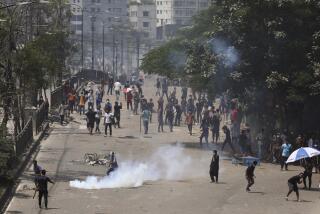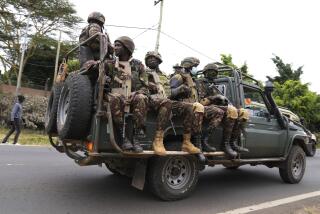Violence Mars Historic Vote in Indonesia
- Share via
JAKARTA, Indonesia — The country’s highest lawmaking body adopted historic measures Friday to transform Indonesia into a democracy.
However, the vote, which would have been unimaginable a year ago, was overshadowed by renewed battles on the streets between protesters and security forces that left at least eight dead and 50 injured.
The clashes began after Friday’s call to prayer as thousands of students, joined by countless jobless youths, poured into the streets in an attempt to reach parliament, where the People’s Consultative Assembly was meeting to debate political reform six months after long-ruling President Suharto was toppled in a popular uprising.
Trying to push their way through barricades blocking access to streets near parliament, the protesters ignored orders to disperse and, coaxed on by agitators, pelted soldiers with rocks. Security forces responded by firing tear gas, rubber-coated bullets and water cannons and chasing down demonstrators, many of whom were beaten with rattan canes.
The clashes swirled through the streets of central Jakarta for four hours, virtually shutting down this city of 10 million. Even before the violence erupted, banks, schools and offices had closed and the normally teeming streets had emptied as nervous residents of the capital feared a repeat of the May riots that claimed 1,200 lives.
Early today, after several hours of an uneasy truce, police again fired tear gas and beat protesters with batons to try to clear a mob of hundreds from Jakarta’s main street.
Friday’s violence had little to do with the original student protests for democratic reform and resembled anarchy.
It was clear that protest leaders had lost control of their own movement, and events on the street appeared to be dictated by the actions of roaming mobs intent on confrontation with security forces.
Ironically, Friday’s clashes--which followed protests that left two people dead and more than 100 injured Thursday--came as the 1,000-member assembly, finding a middle ground after four days of heated debate, yielded to opposition demands for genuine political reform.
In its final announcement Friday night, the assembly agreed to schedule national elections in May, gradually reduce the political role of the military, and consider an investigation into the fortune amassed by Suharto and his family during his 32 years in power.
But the students, heady from leading the popular uprising that resulted in Suharto’s ouster, want more radical reform. Their demands include: no political role for the military; the resignation of Suharto’s successor, President B.J. Habibie; and a commitment to try Suharto for corruption. Their ultimate goal is a fully democratic country wiped clean of the vestiges of the Suharto era.
Whether they will be willing to accept less than a full plate of concessions is unclear.
It was also unclear who the winners are in the outcome of the assembly’s special session--the opposition, the military or Suharto’s Golkar party.
Opposition figures had doubted the assembly’s announced commitment to reforms from the start because half the members were appointed by Suharto or Habibie.
One thing, however, is certain. The violence that marred the assembly debate represents a huge setback to Indonesia’s attempts to regain the confidence of foreign investors and to right its sinking economy.
Despite the students’ unhappiness over the pace of reform, Indonesia--the world’s fourth-most-populous country--has undergone startling changes since Habibie became president. The media have become free, political prisoners have been released, and the future of East Timor, which Indonesia annexed by force, is under discussion. The military has allowed dissent that would not have been tolerated under Suharto.
Still, the students’ continued pressure on the government and their demonstrations outside parliament were clearly setting the agenda for the legislators debating inside.
Delegate Alatab Fahmi said Friday as violence engulfed the streets: “We have to finish tonight, or who knows how the students are going to react?”
One thing that worries many Indonesians is that the student protesters appear to be listening to no one but themselves.
During the May riots, they followed the leadership of opposition figures such as Muslim leader Amien Rais.
Now their chain of command does not seem to extend beyond the gates of their universities.
More to Read
Sign up for Essential California
The most important California stories and recommendations in your inbox every morning.
You may occasionally receive promotional content from the Los Angeles Times.










